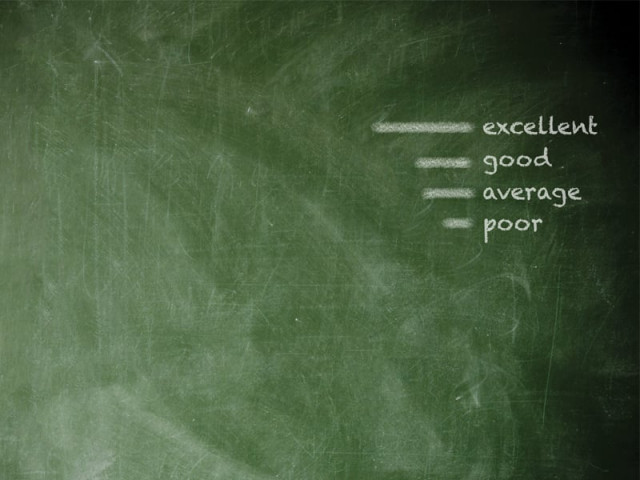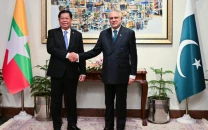Wake up Pakistan!: Where do we stand in the comity of nations?
Pakistan needs to do a lot if it wishes to see itself ranked among the better countries of the world.

The best way to figure out how the rest of the world sees us is to benchmark our performance with others and then rank ourselves accordingly. This process is a standard procedure followed by corporations and professional organisations for assessing regional and global standing, as well as by companies for their employees, which is called the Annual Performance Appraisal.
In each of these activities, feedback is gathered on an individual’s performance from peers, partners and stakeholders and is rated on a scale of ‘outstanding’ to ‘weak’. The same benchmarking activity can be carried out for countries based on economic, demographic, institutional and political performance.
Some of the best known global benchmarking studies are carried out by reputable organisations annually. Each of these studies reviews a different aspect of a country, its economy or its prosperity. Lets go through some:
Human Development Index (HDI)
The HDI is a composite statistic of life expectancy, education, and income indices. It ranks countries into four tiers of human development: ‘low’, ‘medium’, ‘high’ or ‘very high’. It was created by renowned Pakistani economist Prof Dr Mahbubul Haq, and economist Amartya Sen in 1990, with an explicit purpose “to shift the focus of development economics from national income accounting to people-centred policies”. Pakistan ranks 145 out of a sample of 187 countries in this index, ie in the fourth or the ‘low’ human development tier.
Global Competitive Report (GCR)
The GCR integrates macroeconomic and micro/business aspects of competitiveness into a single index. The report assesses how productively a country uses its limited resources and its ability to provide high levels of prosperity to their citizens. Pakistan ranks 124 out of 144 countries.
Democracy Index
The democracy index measures the state of democracy and is based on 60 indicators grouped in five different categories: ie, electoral process and pluralism, civil liberties, functioning of government, political participation and political culture. The countries are finally categorized into ‘full democracies’, ‘flawed democracies’, ‘hybrid regimes’ and ‘authoritarian regimes’. Pakistan is now rated as a hybrid regime, versus an authoritarian regime back in early 2000. Pakistan ranks 105 out of 167 countries.
Global Innovation Index (GII)
The GII is calculated as a simple average of seven pillars, of which the first five are ‘input’ pillars and the last two are ‘output’ pillars. The pillars are: institutions, human capital and research, infrastructure, market sophistication, business sophistication, scientific outputs, and creative outputs. Overall Pakistan ranks 105 out of 125 countries
Legatum Prosperity Index (LPI)
The LPI is an annual ranking of 110 countries and is based on a variety of factors including wealth, economic growth, personal well-being, and quality of life. It reviews 89 variables that are grouped into eight sub-indexes, each with an equal weight. The eight factors are: economy, entrepreneurship and opportunity, governance, education, health, safety and security, personal freedom, and social capital. Pakistan ranks at a poor 107 out of 110 countries.
As can be seen from the table, Pakistan has a long way to go, because in four out of the five studies, we are ranked at the bottom or fourth quartile (in red). In the Democracy Index, we have recently moved up from the fourth to the third quartile. In addition, when we compare ourselves with our three closest neighbours – ie India, Bangladesh and Sri Lanka – we are ranked last in each benchmarking study with the only exception being HDI, where Sri Lanka is ranked one position behind us.
One of the best ways to bring an improvement across the board is to focus on the 2015 Millennium Development Goals (MDG), set by the United Nations in 1990 for the entire world. The MDG are made up of eight key goals ranging from: eradicating hunger (reducing poverty); providing universal primary education; providing gender equality and woman empowerment; reducing infant mortality (needs improved health care, sanitation and safe drinking water); improving maternal health; combating diseases; ensuring environmental sustainability; and, finally, global partnerships for development.
Our popularly-elected government will have to take extraordinary measures in order to achieve many of the targets set up for each of the MDG goals. This will only be possible if these targets are given the status of ‘no-miss’ goals to relevant ministries, with strong accountability and punitive measures accompanying them if no progress is made.
We can forget about competing with the rest of the globe if these measures are not taken, as there is much stronger commitment, planning and strategising to achieve these goals elsewhere. I have no doubt that we deliver a few of the MDG goals by 2015, if we as a nation focus single-mindedly in driving prosperity and improving the standards of living for the average Pakistani.
THE WRITER WORKS IN THE CORPORATE SECTOR AND IS ACTIVE ON VARIOUS BUSINESS FORUMS AND TRADE BODIES
Published in The Express Tribune, November 5th, 2012.



















COMMENTS
Comments are moderated and generally will be posted if they are on-topic and not abusive.
For more information, please see our Comments FAQ